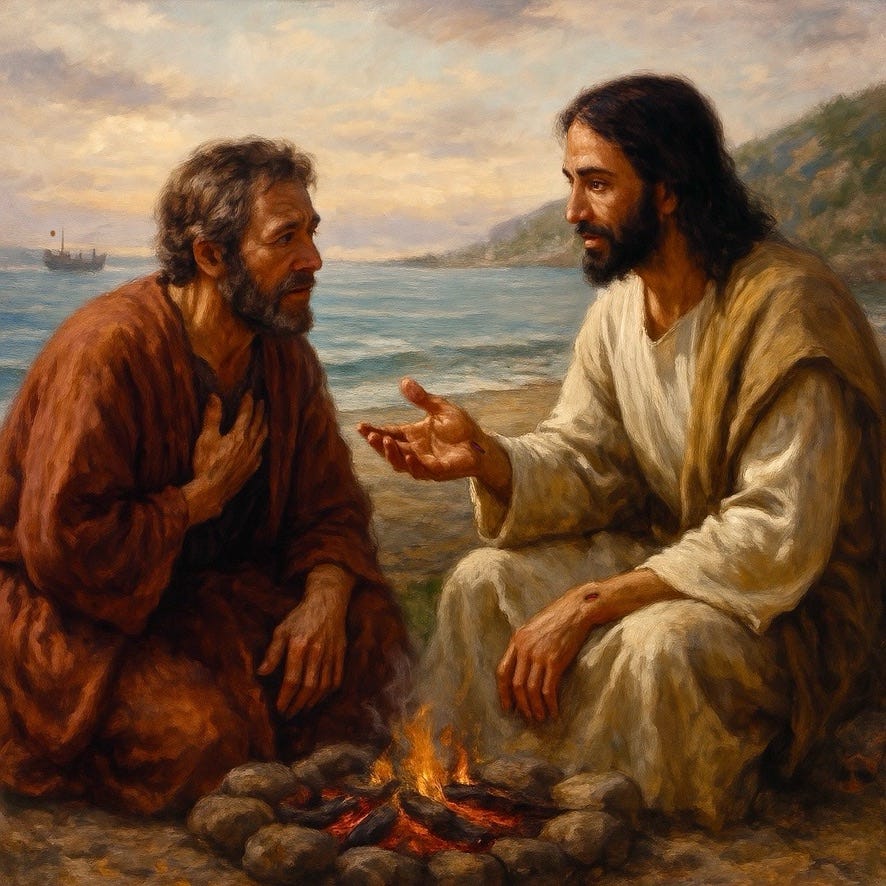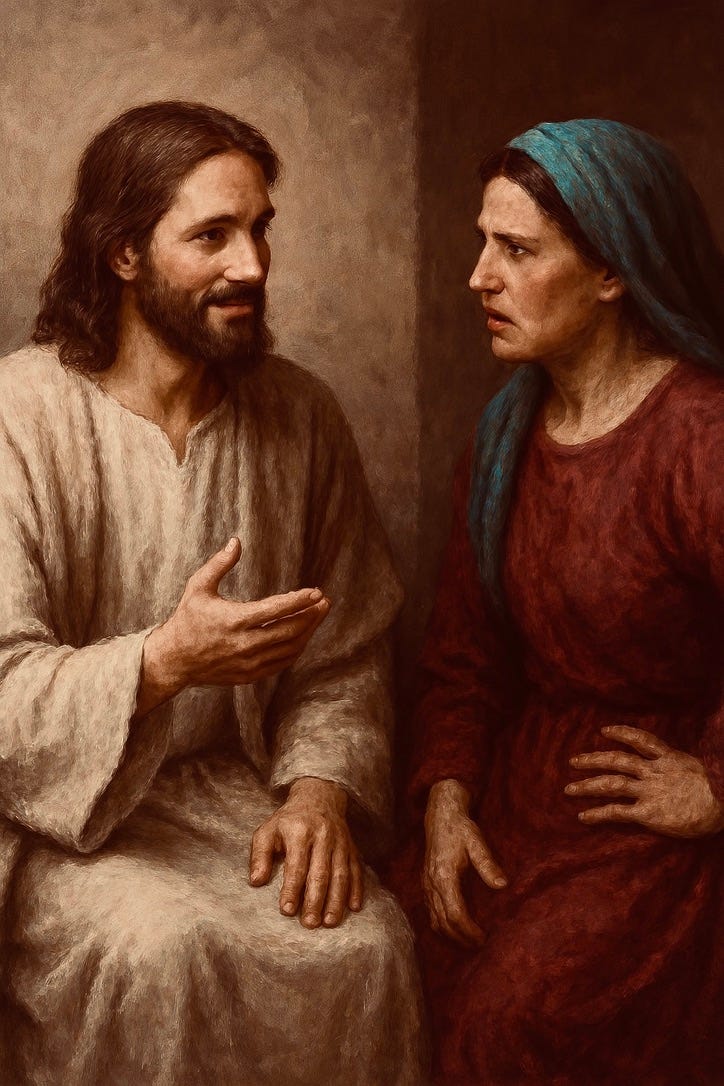Lavish Love and the End of Rivalry: A Meditation on the Eighteenth Sunday in Ordinary Time (Year C)
Why God’s love looks wasteful to hearts still keeping score (Luke 12, Ecclesiastes 1, Colossians 3)
“Friend, who made me judge or arbitrator over you? Take care to guard against all greed, for life does not consist in possessions.” — Luke 12:14–15
The Door We Keep Leaving Open
From the time we are children, we cry out for someone to make life fair. We want a parent, a teacher, a coach, a referee to step in, to see what we see, to defend us when the rules feel broken. Sometimes this longing is just. But so often, deeper down, it’s about wanting safety, validation, worth—the certainty that we’re not less loved or less valuable than someone else. We want a judge to say, “You matter more than they do.”
The enemy knows this ache. From the first temptation, he has whispered that God is holding out, that love and blessing are limited, that someone else has what should be yours. That lie opened the first doorway to destruction:
“Sin is crouching at your door… its desire is for you, but you must rule over it.” — Genesis 4:7
Cain glanced sideways at Abel and believed favor was a contest. That glance became envy, envy became hatred, and hatred spilled blood. Rivalry is not the core disease—it’s the visible wound of a heart unsure of love. The same lie drove Joseph’s brothers to betrayal (Genesis 37), Saul to hunt David (1 Samuel 18), and even angels to fall, grasping for a higher place in heaven.
This doorway remains open in every human heart until God Himself closes it with His love.
Jesus Refuses the Accuser’s Game – Luke 12:13–21
This week’s Gospel begins with a plea that sounds familiar:
“Teacher, tell my brother to divide the inheritance with me.” — Luke 12:13
It’s the grown-up version of a child’s cry for fairness. Rabbis in that time often acted as judges in family disputes. The man wants Jesus to take his side, declare him right, his brother wrong. But Jesus refuses:
“Friend, who made me judge or arbitrator over you? Take care, and be on your guard against all greed, for one’s life does not consist in the abundance of possessions.” — Luke 12:14–15
Though He is the Judge of all the earth, Jesus will not join the accuser’s court. He exposes the deeper danger: a heart looking to verdicts, shares, possessions, or fairness for security and identity, instead of resting in the Father’s love.
He tells a parable of a rich man stockpiling grain, building bigger barns, dreaming of safety in wealth, only to lose his life that very night:
“So is the one who lays up treasure for himself and is not rich toward God.” — Luke 12:21
True inheritance cannot be measured, divided, or compared. Life is not secured by fairness or possessions. It is received in relationship with the Father.
Vanity and the Ache for Enough – Ecclesiastes 1:2; 2:21–23
The Old Testament reading names this longing clearly:
“Vanity of vanities, says Qoheleth… What do mortals get from all the toil and strain with which they toil under the sun? Their days are full of pain, their work is a vexation; even at night their minds do not rest.”
Comparison promises peace but only breeds restlessness. Striving to secure worth through performance, appearance, fairness, or winning never satisfies. Even in victory, the heart stays hungry.
Teach Us to See – Psalm 90:3–6, 12–14, 17
“Teach us to number our days, that we may gain a wise heart… Satisfy us in the morning with your steadfast love, that we may rejoice and be glad all our days.”
Wisdom begins when we stop glancing sideways and start lifting our eyes to God’s love. His steadfast love is not earned, ranked, or portioned out. It cannot be taken away by someone else’s blessing. It is the one treasure that frees the soul from needing verdicts or proof.
Faith That Lets Go – Abraham and Lot (Genesis 13:8–9)
When Abram’s herdsmen quarreled with Lot’s, he refused rivalry:
“Let there be no strife between you and me… Is not the whole land before you? If you take the left, I will go to the right.”
Abram could release the better pasture because his identity and future weren’t in land or shares but in God’s promise. Faith knows no one can steal what the Father has prepared. Trust shuts the door that comparison tries to pry open.
Even Jesus’ Closest Companions Struggled
This isn’t just an Old Testament problem. Even those closest to Jesus wrestled with comparison:
The Last Supper (Luke 22:24): They argued over who was greatest while Jesus poured out His life for them.
Parents vying for favor (Matthew 20:20–21): The mother of James and John begged for seats of honor in the kingdom.
Peter and John racing to the tomb (John 20:4): Resurrection morning became a contest.
Peter comparing himself to John (John 21:20–22): Even after forgiveness, Peter asked, “Lord, what about him?
”
Fear of being less loved, less chosen, less important—it haunted even the inner circle of disciples.
Lavish Love and the Better Portion
A few weeks ago, we heard the story of Martha and Mary (Luke 10:38–42). Martha was anxious for recognition, longing for fairness: “Lord, don’t you care that my sister has left me to serve alone?” Jesus answered gently:
“Martha, Martha, you are worried and distracted by many things; there is need of only one thing. Mary has chosen the better portion.”
Mary simply sat at His feet, knowing she belonged. Later, she took a jar of perfume worth a year’s wages and poured it over Jesus (John 12:3). The disciples scolded her for waste. They were still counting value and fairness. Mary’s heart was free. Lavish love looks foolish to a heart still desperate for validation, but to one secure in Christ, nothing is safer than pouring everything out for Him.
Raised to a New Identity – Colossians 3:1–11
Paul says:
“You have put off the old self… and have put on the new self… Here there is no Greek or Jew… slave or free, but Christ is all and in all.”
The gospel gives a new self that no verdict, rank, or rivalry can touch. In Christ, there is no “favorite child.” Even the lowest place in His house is drenched in honor:
“I would rather be a doorkeeper in the house of my God than dwell in the tents of the wicked.” — Psalm 84:10
The kingdom’s economy is not scarcity but abundance, not status but love, not verdicts but relationship.
Love That Seeks, Not Compares
Jesus tells story after story to show the Father’s heart:
A shepherd leaving ninety-nine to find the one (Luke 15:4).
A father running to welcome a son who squandered everything while the elder sulks over his share (Luke 15:20–31).
A vineyard owner paying late comers as generously as early workers (Matthew 20:14–16).
The Father’s love doesn’t keep score. It rejoices when the lost are found, when the lowly are lifted, when every seat at the table is filled. This love exposes the enemy’s scheme of suspicion and fear, closes the doorway to rivalry, and heals hearts that no longer need proof of their worth.
An Invitation
This Sunday’s readings ask us to let Jesus reach beneath our disputes and rivalries, to the deeper wound of an identity still scrambling for security and validation. The enemy has long used this doorway to fracture love, but Jesus came to close it forever.
In Him, we are not contestants in a game for blessing. We are beloved children of a lavish Father, free to stop glancing sideways, free to release the better pasture, free to pour out everything like Mary did—because nothing can add to or subtract from the love we already have.
Life rich toward God is life freed from rivalry, safe in His love, overflowing toward others.


